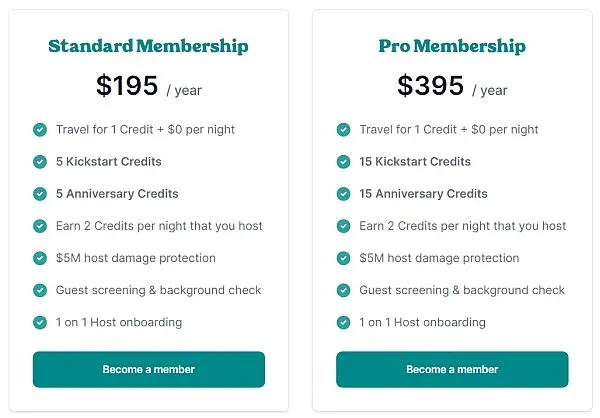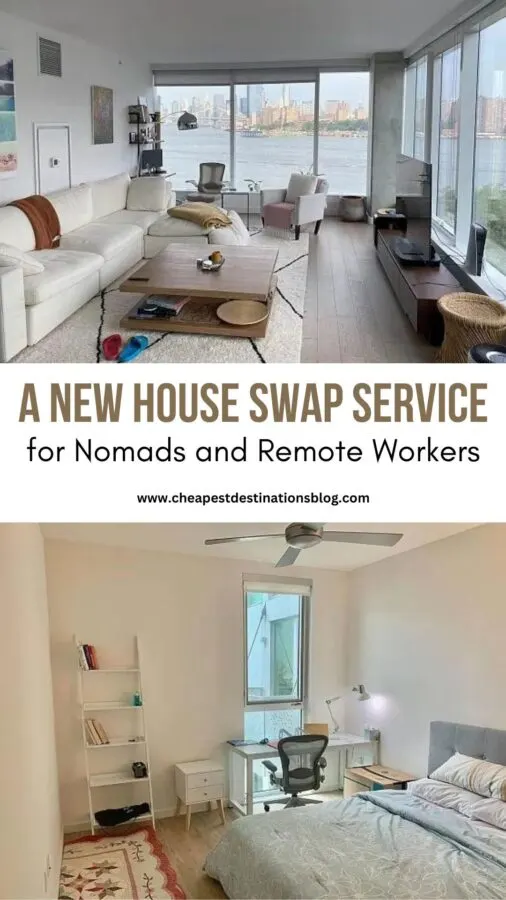Do you have a laptop job of some kind where you can work from anywhere around the world? Do you run a remote business or does your work-from-home arrangement take you to a new home sometimes? Then you’ll probably be interested in a new membership club I signed up for recently that’s a house swap service for digital nomads.

The company is called Noad Exchange and they’re aimed squarely at location-independent workers who need to keep working, at least sometimes, while on the move. I don’t know about you, but I’ve stayed in more than a few Airbnb or Booking.com apartments where the work situation was far less than desirable. Instead of having a high-speed fiber connection from a company like Xfinity Internet, they’ve got some DSL or low-end cable plan where pages are loading slowly and it takes an hour to upload a video.
I often ended up with work left undone because of slow internet speeds and muscles needing a massage because I had a lousy desk chair and workspace.
Needing a massage every day or two may be no big deal if you’re in Thailand or Cambodia, where one will cost you less than ten bucks, but still. Wouldn’t it be better if the place you were renting had a workspace set up by a fellow digital nomad or remote worker, someone who has the same needs you do? A place where you know the WiFi will be fast, unlimited, and reliable?
Now it gets even better: what if that apartment or house you got in a home exchange was only going to cost you a cleaning fee? Even if you’re in Paris or New York City?
A Home Swap Membership Plus Cleaning Fees Only
Noad Exchange is a membership program that’s meant to offer an unbeatable deal to its members where they can stay around the world for very little. You pay an annual fee to join and you build up credits in your account in various ways, primarily through other people staying at your home. Then you use those credits (2 per night earned) to spend staying elsewhere, at a rate that’s always an easy one credit per night.
After that, all you pay is the cleaning fee, which varies a bit by market, but let’s say it’s $75 for where you’re staying for a week. Taking out the annual fee for now, for a week you just pay 7 credits plus $75, even if you’re in a flat next to a canal in central Amsterdam or a penthouse apartment in a ski resort area. Every member’s place is the same price of one credit per night.
Check out all the members’ homes here. (See if you can locate mine…)
You can get started right away too because you get credits when you sign up. If you choose the cheapest option, you still get enough credits for 5 nights, so that comes out to $40 per night if you don’t manage to rent out your own place at all. When you do though, you’ll get 2 credits per night they stay. If you get the Pro membership though, the 15 credits you get right away for 15 stays will average out $26.33. There aren’t a whole lot of cities where you can get a nice apartment or house for $26 per night plus a cleaning fee.
Again, rent your own place out and you’ll bank more credits. So that price per night will keep going down and down. Just one trip will cost you less than what a rental through Airbnb probably would, so it’s easy to earn back your membership fee with one house swap.
But wait, there’s more! Join with my insider code and you’ll get 3 extra credits to start. Use exclusive invite code ALCENTRO when you register with your own home. Sign up here.
How Noad is Different From HomeExchange.com and Others
I belong to HomeExchange.com and if you want to go join that one, I don’t have any issues recommending them. We have had great experiences there and we’re using them again next month to do a house swap with someone in Puerto Vallarta. No money exchanged, no tax implications, far less hassle than renting your own place out through Airbnb or Vrbo. (We’ve done both in the past.)
The problem is, you’re often exchanging with someone who commutes to a job or has the place you’re using set up as a vacation home. They’re often not doing work when they’re there and a desk chair is way down their list of priorities. Some of them we looked at in Greece before setting up two exchanges there actually had “no internet access” in their listing. In 2023.
So we didn’t even contact those people. The two places we ended up renting through HomeExchange during our Greece travels were fine. We got a good bit of needed work done in between trips to the tavernas and beaches.
If we had rented through Noad Exchange though, we wouldn’t have had to read 50 listings in detail and try to decipher the WiFi situation. You can’t get listed on Noad’s home exchange service if your WiFi isn’t fast and strong.
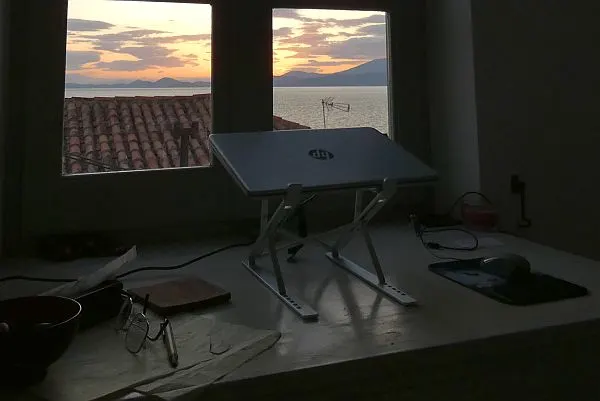
I’ve also found that a lot of regular home exchange members are retired. After all, that’s when you’ve got plenty of time on your hands to exchange with other people on different continents. Remote work has turned that idea on its head though. Now many people of working age can take off whenever they want and go work somewhere else. Noad is aimed at them.
The people who list their homes on Noad Exchange are likely to be more receptive to your requests as well. They’re location-independent after all. So it’s not just four weeks a year that their place is available. For many of them, it’s always available. They’ll just pack a bag and go explore another place if you’re staying there and earning them credits.
The company has a really good FAQ section here that answers most questions you probably have, including whether a place you’re renting can go onto the platform.
A Hedge Against Airbnb Bans
I wonder sometimes what percentage of Airbnb rentals are nomads instead of vacationers. We sure rely on the platform a lot when we’re going somewhere for a few weeks or a month at a time. We’re the ones most likely to rent the places that are not right in the main tourist areas too, maybe a subway ride away because we’re not going to be sightseeing every day anyway.
The downsides of that platform are getting worse though, even leaving out rising fees.
Not only is the Airbnb experience less than desirable sometimes for a lot of remote workers, but in some cities the options for short-term rentals are narrowing down or disappearing. The latest to stop the advance of Airbnb rentals is the city of Florence, which is halting all new rental listings as of this week. (The ones already registered can continue.)
This is just the latest in a flurry of clampdowns and rollbacks that are popping up around the globe. New York City has basically banned these rentals now unless owners are on site too, while Amsterdam, Berlin, and Lisbon have all made it harder for owners to rent out their apartments on a regular basis to travelers. Vrbo has pulled out of some markets entirely because the tax or fee demands from local governments were too onerous to comply with.
Sometimes these efforts are just a way to increase government revenue since many tourism boards get all their funding from hotel taxes. But more often it’s a way to combat what many locals see as a loss of long-term rental options for the people who actually live there. It’s generally a city center/tourist area problem and there’s no doubt that Airbnb is a scapegoat for a rise in housing prices in general, but it’s safe to say this trend is more likely to increase than decline.
If you join Noad Exchange and use that to travel instead, you get around this problem and spend less as well. As the platform continues to add more members and grow, you should start seeing options where you’re planning to go. In the meantime though, in New York City you could be staying in a work-ready apartment that looks like this:
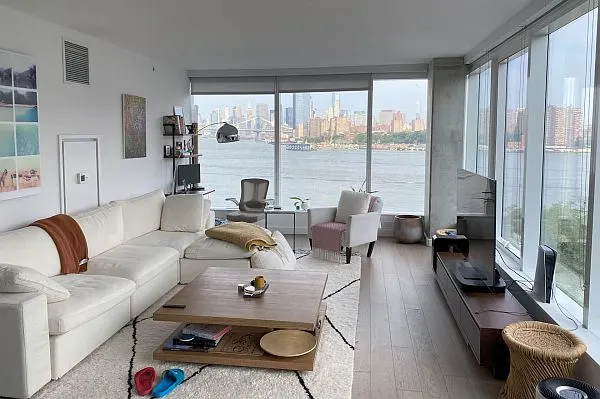
Your Private Digital Nomad House Swap Club
Right now this is a rather exclusive club, with about 100 homes on the platform, but that’s surely going to rise as people like me get the word out and the network effect starts happening. Even now though, you can stay in very desirable places like Cape Town, the Algarve, Tenerife, Seattle, Denver, Oaxaca, and on and on.
Since you’re exchanging with like-minded people who put a high value on travel and freedom of movement, there’s a better chance you’re going to love where you’re staying than be “meh” about your rental you got from Airbnb. And you’ll save a small fortune by being a member of a club instead of a general public customer.
If you daydream about what it would have been like to invest early and get in on the ground floor of sharing economy companies like Uber, Airbnb, Zipcar, or Instacart, you’ve got a chance with Noad. If you believe this concept has huge potential, you can grab a piece as an individual investor. They’re offering an early funding round open to subscribers where you can get equity in the company at a very low valuation compared to where they’ll probably end up.
If you put in $500 you get a free Pro membership for a year. Put in $5K and you get membership for life, with 15 credits a year. So you can basically buy 15 apartment nights a year forever for only $5,000. So even if they never have an exit that pays out to investors, you’re still getting your investment back in services, maybe several times over if you’re young and you travel a lot.
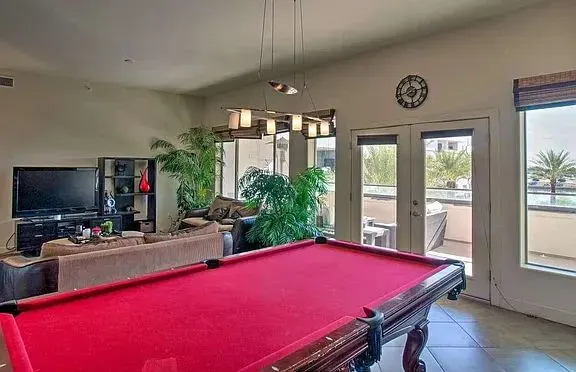
DISCLOSURE: I am not a financial advisor! Like most early-stage investments, this is a gamble based on a great idea but a limited track record. Only take a flyer with what you can easily afford to lose. If you’ve got some cash you’re itching to deploy though, stack a little of it on top of what it would cost you to get a membership anyway and there could be a big upside.
Get the details on the funding campaign here.
Sign up as a user with invite code ALCENTRO and get 3 extra credits good for 3 nights in an apartment or house.
Pin it!

